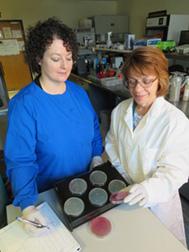Addressing a Major Health Threat

Antibiotics and antimicrobial agents have been saving lives since the 1940s, but their overuse has led to the rise of bacteria that are resistant to antibiotics. In a troubling trend in the United States, at least 2 million people become infected with bacteria resistant to antibiotics every year, and at least 23,000 people die as a result. That makes antimicrobial resistance one of the most serious health threats known to both humans and animals.
In the search for alternatives to antibiotics, ARS scientists have worked with public and private partners to develop animal vaccines, antibody therapies, and strategies for enhancing the immune systems of farm animals.
In Fayetteville, AR, ARS scientists patented and licensed a phage—a virus that naturally kills bacteria-that is now being used to reduce disease in millions of chickens. ARS researchers in Athens, GA, were the first in the United States to find a bacterial gene in livestock that causes resistance to colistin, an important antibiotic drug.
In College Station, TX, ARS scientists patented a pre-harvest feed additive that significantly reduces post-harvest E. coli levels in livestock and poultry.
Related Information
Article: ARS’s “One Health” Antibiotic Awareness
Research Project: Plasmid mediated colistin resistance in food animal intestinal contents detected by selective enrichment



